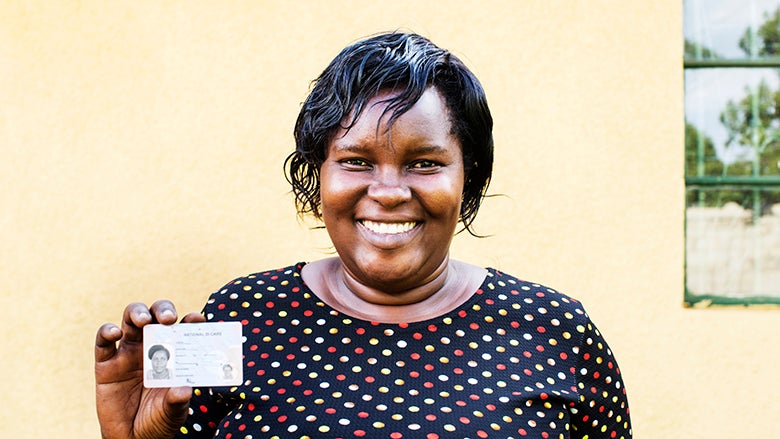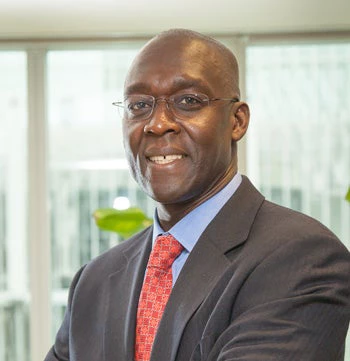
An estimated one billion people around the world – half of which are in Africa – lack official identification to prove who they are. And many millions more have forms of identification that cannot be reliably verified or authenticated. More than 450 million of these are children who have not had their birth registered. Women and the poor in low-income countries are less likely to have official identification.
Without a trusted and secure way to prove their identity, the poorest and most vulnerable face challenges in accessing healthcare, education, and financial services, as well as opportunities that can improve their economic and social mobility.
Take for example Miriam, a cross-border trader from Uganda, who makes her livelihood by buying and selling goods at markets on either side of the border with Kenya. Life was hard and risky for many women like Miriam who had no official proof of identity – let alone a passport. They had to cross borders irregularly to make a living, making them more vulnerable to exploitation, theft, and violence. In 2015, Miriam received her first national ID card through a mass registration that Uganda launched a year earlier. The following year, Kenya, Rwanda and Uganda entered into an agreement that recognized each other’s national ID cards as valid travel documents.
These changes transformed Miriam’s life. With an ID, she was able to open a bank account and cross the border through regular channels, which has helped her to grow her business. This has also reduced the costs of trade and enabled her to send her goods to other parts of East Africa. Because Miriam can reliably assert her identity, it is easier for her to access financial services, to obtain a mobile phone, to take part in the digital economy – opportunities that were out of reach before.
Mission Billion challenge
While there are tremendous benefits associated with digital identification, there are also data protection and privacy risks when it is not supported with sound legal and regulatory foundations and intentional design. This is why the World Bank Group’s Identification for Development (ID4D) initiative has launched the Mission Billion innovation challenge.
The aim is to tap on the world’s innovators for new ideas to tackle some of the toughest challenges developing countries face when introducing digital identification and civil registration systems, in particular, protecting privacy and empowering people to control their personal data. The Challenge offers cash prizes totaling US$100,000 with the top prize of US$50,000 for the most promising solutions that are practical and relevant for developing countries – which face circumstances such as low or unreliable connectivity or low levels of literacy.
Promoting ‘Good ID’
In 2014, the World Bank Group established the Identification for Development (ID4D) initiative, which helps countries to realize the transformational potential of digital identification and civil registration. The initiative already provides technical assistance and financing to more than 40 countries, and almost $1 billion have been mobilized for this work, working closely with partners such as the Bill & Melinda Gates Foundation, the Australian Government and the Omidyar Network, other development partners and the private sector.
Beyond reaching the invisible billion, the partners are committed to also strengthen privacy and provide people with control over their data, along with inclusion and choice. These are the tenets of the ‘Good ID’ movement, which promotes digital identification systems that maximize developmental impact while minimizing the risks.
The ID4D initiative continues to proactively walk the talk of the ‘Good ID’ movement: from bringing together a community to develop the 10 Principles on Identification for Sustainable Development which is a guiding framework that outlines what ‘Good ID’ looks like in practice; to supporting the development of comprehensive legal frameworks of data protection and privacy in our client countries; to helping countries adopt inclusive consultative practices for marginalized groups, including the disabled in the design and operations of digital identification systems; and publishing knowledge resources and advising government to adopt context appropriate and open standards with the aim of preventing vendor and technology lock-in.
Calling all innovators!
Digital identification is a key tool for ending extreme poverty and promoting the inclusion of the world’s invisible people. This agenda will only gain pace, and the international community must keep up with this momentum, while also adapting in an ever-changing environment. While much has been done, much more remains. Mission Billion is an exciting opportunity to strengthen this work to realize the full potential of what ‘Good ID’ can accomplish. However, we need your ideas to tackle these tough challenges. We call on all innovators, creative thinkers, engaged citizens and all those who are passionate about development to contribute to the Mission Billion Challenge, to help ensure that ‘Good ID’ is not only a principle, but also a reality for all.


Join the Conversation